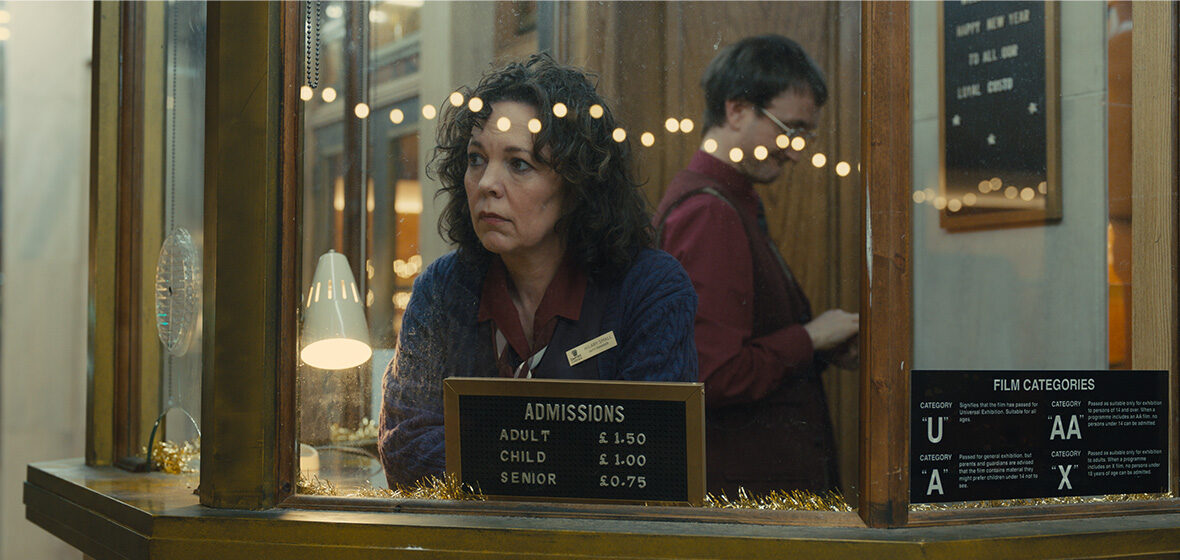The Law Society and Kismet films have three double passes for the upcoming Academy Award nominee To Leslie
Inspired by true events. A West Texas single mother (2023 Academy Awards nominee Andrea Riseborough) wins the lottery and squanders it just as fast, leaving behind a world of heartbreak. Years later, with her charm running out and nowhere to go, she fights to rebuild her life and find redemption.
The Law Society and the Alliance Francaise French Film Festival also have ten double passes for this year’s festivals, with a program that includes much-anticipated films such as the witty and stylish Masquerade, by French comedian and director, Nicholas Bedos, and Oscar-winner Michael Hazanavicius’ wonderfully weird zombie-comedy Final Cut.
To win one of the passes, please email us your name and LawID number with the subject line TO LESLIE or FRENCH FILM FESTIVAL to journal@lawsociety.com.au before 10 Wednesday 8 March.
Empire of Light
I had a film studies teacher who would remind the class about the importance of the first shot in a film. “Think about why the filmmaker chose this as the calling card for the film,” she used to say. “It’s a shot not impaired by the constrictions of story or character. It exists in a vacuum; also, even if unconsciously, it presents the thesis of the film we’re about to see.”
I disagreed a lot with this professor, but this particular lesson stayed with me. A movie’s first shot is visual cinema on a philosophical level.
The first shot in Empire of Light, Sam Mendes’ love letter to the emotional power of cinema, is of a popcorn machine. This may sound innocuous. But why not a popcorn machine? What’s the first thing you think about when you think about the cinema? The overwhelming feeling of glee that a happy ending gives you? The emotional purge of a sad flick? No, it’s the salted snack with the annoying crunch. Forget Spielberg; it’s all about those kernels stuck between your teeth.
It says a lot that this is how Mendes starts the montage at the beginning of his film. Later in the montage he shows a phrase etched in a mural that reads, “Find where light in darkness lies”. Why not start there instead?
Empire of Light is a film that struggles with its identity. It follows the story of Hillary (Olivia Colman), a downhearted duty manager at a cinema on the English south coast. The perfect employee, she’s the first in, last one out. Her life is empty, which she confesses to her doctor. She lives alone, and the only physical connection she has is through awkward, recurrent sexual encounters with her married boss, Ellis (Colin Firth).
Hillary has never seen a film in her life, even though she’s almost 50, which I suppose is a way to show her life is incomplete. Poor Hilary: 9 to 5 is playing at her theatre. If only she had watched it, she could have gained some perspective on her labour issues.
Hillary’s world is rocked when Stephen (Michael Ward) arrives as the new employee. Stephen, the son of a Windrush immigrant, wants to eventually study architecture but is happy working at the cinema. He loves films, and watches them whenever he can. In one of his first encounters with Hillary, the two of them visit an abandoned hidden section of the building, where Stephen carefully nurses a bruised pigeon back to health. The metaphor is blatant; no film deserves an eye rolling scene like that.
Because this is the 80s, and Stephen is black, racial politics play into the story. Still, Mendes, who also wrote the script, doesn’t know how to address the issue without bringing into it his voice of privileged white guilt. The interactions around the subject play with the heavy-handedness of someone on a roll about injustice, entirely out of tune with the weight of the lived experience of those it represents. There’s a profoundly jingoistic moment where a black man explains to a white woman a bareback version of the traumatic violence of systemic racism. The scene ends with a feel-good moment between the two, and is followed by a scene where the lovely projectionist (played by Toby Jones) muses about the poetry of the light travelling from projector to screen. This succession of scenes is not tone-deaf; it’s toneless.
The problem is that the film demands to be taken for the prestigious movie it wants to be, and yet none of its poetic ponderings have the emotional weight of Cinema Paradiso. Its social critique is so clunky it fails to deliver any introspection – which Mendes, from his position of privilege, should certainly explore.
And yet it looks gorgeous. The cinematography by Mendes’ usual collaborator since the passing of Conrad L. Hall, Roger Deakins, captures the romantic traits the script misses. The soundtrack by Atticus Ross and Trent Reznor leaps playfully from background foyer tune to intense Icelandic post-rock. There’s a moment near the end where I was so engulfed by the images and the melody that I zoned out and couldn’t remember what was happening. I was clinging for dear life to anytthing I could use to draw emotion from myself – and it wasn’t the story, or its character.
Empire of Light is a film that wants to be many things and, in the process, spreads itself too thin. I don’t doubt Mendes’ capacity as a director, nor should I – his career proves what he’s capable of. But I suspect this wasn’t the right project for him. One of the traits of the script, which Mendes undoubtedly considered really clever, is that there is an unofficial chapter division signalled by the playing of a new film in the cinema. Blues Brothers is the first movie about the positive power of mixing cultures against the establishment’s wishes. The aforementioned 9 to 5 signals the need to fight the labour patriarchy. As the film goes on, the use of metaphor starts to get lazy – I’m guessing Raging Bull was featured to forecast that someone would be beaten to a pulp. The last film featured is Being There, Hal Ashby’s masterpiece about a naive man, played by Peter Sellers, discovering a world he never knew. The final shot of Being There runs in all its glory, and I teared up for no other reason than that it’s an ending that always makes me tear up.
So there you go: Cinema Paradiso is a film that reminds you that movies are beautiful. Empire of Light reminds us to go and watch Being There.
Verdict: 2 out of 5
Fans of Olivia Colman rejoice: she is expectedly terrific in this. Everyone else should go and watch Cinema Paradiso or Being There instead.




